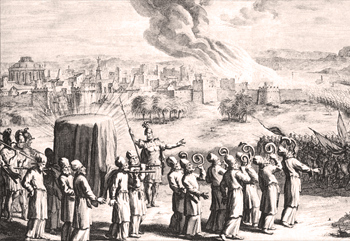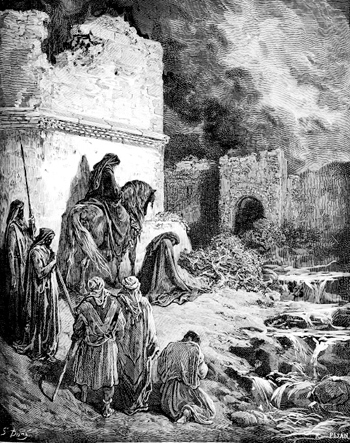Editor’s note: Faith & Leadership offers sermons that shed light on issues of Christian leadership. This sermon was preached at First United Methodist Church in Montgomery, Alabama, on March 1, 2015.
God is about to take Elijah up into heaven, and everybody knows it.
When it happens, it will be an event such as no one has ever seen or experienced. Elijah is the only person in the whole Bible who visibly ascends to heaven without dying first. We watch as he is scooped up in a great whirlwind, with chariot and horses of fire. This is a world-class miracle, entirely unique, which vindicates Elijah’s whole prophetic career.
He could use some public vindication, since Elijah is almost always in an oppositional situation with the powers that be: Ahab, king of Israel, and his queen, Jezebel, who would like to see the contrary prophet dead. He is also in an oppositional situation with most of the other prophets in the land of Israel, who are content to serve the royals and the gods (or idols) they worship. In a word, Elijah has more than a few powerful enemies.
So you’d expect it to be a major public event when God vindicates the true prophet. Yet it seems that only one person sees Elijah’s fiery ascent: his disciple, the apprentice prophet Elisha. A single witness, and that not even an influential person -- just a kid, really, the young man who calls Elijah “my father.” The chariot and horses seem like a wasted photo opportunity.
Another wasted opportunity you might wonder about: why does the narrator focus so little on the dramatic potential of the story? There are not one but two major miracles in the passage we heard: the chariot of fire, and also that bit about Elijah striking the Jordan River with his cloak, parting the waters, so the two of them passed through the riverbed on dry land. It’s like Moses parting the Red Sea; this is a sign that Elijah has attained to the status of the father of all the prophets.
Yet the narrator passes over the two confirming miracles quickly, giving hardly any details, and dwells on something else entirely -- something that hardly seems important at all, in terms of Elijah’s public career -- namely, the long goodbye between Elijah and Elisha, when Elisha does not want to let his teacher go.
It’s a long walk these two take together, in the final days, as they journey from one region or town to the next. Elijah is trying to slip away, to be alone when God takes him.
“Stay here,” he says to Elisha at Gilgal; “God is sending me to Bethel” -- a couple of days’ journey away. And Elisha flat-out refuses to be left behind: “As God lives and you yourself live, I am not leaving you!” (2 Kings 2:2).
The scene is repeated several times, until at last Elijah realizes why the young man won’t let him go: because there is something this disciple still needs from the master. “So ask me, [Elisha] -- what can I do for you?” “Let a double share of your spirit come to me,” the young prophet answers (2:9).
To translate that request into language we can more readily understand: “I want to be devoted to God, as fully as you are -- a person whose whole life is shaped and guided by faith. I have been your disciple; now, my father, give me your legacy. Share with me the spirit of God that I see in you.”
I confess that before working on this sermon, I had never before paid any attention to this poignant scene that brings an end to Elijah’s stormy story, and I need to ask myself why it never made any impression upon me.
Maybe I read past it for the simple reason that this is a story about discipling, and that is not something that Episcopalians talk about very much. I notice that the dictionary lists the term “discipling” as “archaic, obsolete,” even as religious language. Strange that discipling, the foundation and heart of Jesus’ own ministry, should be an obsolete notion in the church.
So let’s use another word. My colleague Greg Jones speaks of “holy friendship,” or “God-centered friendship,” and that is exactly what Jesus’ discipling was about. “I have called you friends,” Jesus says to the intimate band of 12 (John 15:15). So let’s talk about holy friendship, and consider what this story about Elijah passing on a spiritual legacy to the younger prophet might mean for any of us, younger or older, more or less experienced in the life of faith.
One day Elijah had seen the young man Elisha plowing the field on his parents’ farm, and Elijah literally threw his prophet’s mantle over him. Then Elisha up and followed after him and became his disciple (1 Kings 19:19-21) -- in a flash, on a whim, just as one day still long in the future those Galilean fishermen would leave their boats and nets to follow Jesus.
As far as we know, the two were strangers to each other, yet Elijah glimpsed something in this youth that no one had seen before, and Elisha had the courage to accept the prophet’s call, little though he could have understood it.
We don’t know how long these two were bound together in holy friendship -- was it years, or perhaps just a few intense months? We don’t need to know, because it is the depth, not the duration, of the friendship that matters. They are together long enough so that when Elijah is taken up, he is able to pass on to the younger prophet Elisha the spiritual legacy of a new self, a self that is wholly oriented to God. That is who Elijah was, and who Elisha eventually grew to be under his tutelage: a self wholly oriented to God.
Holy friendship addresses the basic human need to draw close to God. That need and desire receives very little acknowledgment in our general society. Sometimes even within the church, we may not know how to talk about it, or how to recognize our own desire to be close to God.
Yet nurturing that desire and meeting that need is the sole reason for the church’s existence. We may provide a few valuable social services and something we rather vaguely call “community,” but the purpose of the church is to enable people to grow toward God in Christ.
The church does its job in two related ways: first, by organizing worship, and second, by encouraging holy friendship. The aim of all the elements of worship -- music, prayers, sacraments, preaching -- is to create a space and time in which we turn our restless minds toward God, so that we can imagine, if only for a few flickering seconds, the dimension of existence that Jesus called “life in abundance” (cf. John 10:10).
And holy friendship is the complement to worship. If worship is working, if it is creating an environment in which people are beginning to desire the presence of God, wanting to see more deeply into that mystery, then we need friendships in which that desire can be acknowledged and that mystery talked about. Sometimes, like the young man Elisha, we need to spend time with someone much more practiced in the presence of God than we are.
More than 30 years ago, when I was a theology student in England, I met regularly for spiritual direction with Sister Mary Kathleen, a cloistered nun. When I began meeting with her, I did not know what to ask for; I knew only what I lacked: peace of heart. She quickly recognized that I did not know anything about prayer, and so she took it upon herself to teach me how to set aside a quiet space in my life for God to enter and speak.
It was slow daily work; there were no dramatic moments when the heavens suddenly opened. Yet one day, at the end of about nine months, I realized that I was no longer confused and restless. Undramatically, yet with a certainty that had previously eluded me, I knew what I was meant to do with my life, namely, to preach and teach for the church.
I left England soon after that, and Sister Mary Kathleen became a hermit (literally), her life wholly devoted to prayer. I did not see her again until last year, when she had returned from the hermitage to community life in the convent. She is now 90 and did not remember me at first, but after we had sat together for a minute or so, her eyes brightened and focused on me: “Oh,” she said, “I did not remember your name. But now that I hear your voice, I know who you are. I remember that young woman, who knew she was called to do something but did not know what it was. I remember her struggle; yes, I know just who you are.”
Indeed, she knows who I am. Those many years ago, Sister Mary Kathleen knew better than I did who I was struggling to be, and she helped me to become myself. I grew closer to God through holy friendship with this woman, who is so much more fully oriented toward God than I am. You might say she gave me a double share of her spirit.
You don’t have to be someone of Elijah’s spiritual stature, or Sister Mary Kathleen’s, in order to pass on something of real substance through holy friendship. Most Sundays, a small group of women meets for an hour before we go to the 11 a.m. service at Duke Chapel; sometimes there are two or three of us, sometimes four or five, gathered for Christian conversation and prayer.
We have been doing it for four years or so. We were summoned into a group, not because we were personal friends (we weren’t), but because one common friend asked each of us to offer prayer for her husband, who was gravely ill. So we began, and within a few months another of us lost her house in a fire; elderly parents and adolescent children met with various challenges. Difficulties smaller and larger emerged for us and those we love, and gradually we realized that we are called to stay together, as a tiny but (for now) durable part of the body of Christ.
We call it the Heart Circle. There is no leader and no advance agenda; we simply bring to each other whatever is on our hearts, for honest and loving conversation, and for prayer. Sometimes we celebrate together; we also sigh and laugh and grieve. We disciple each other as we try to bring the light of Christ to the dark places we perceive within ourselves and in the world; we name before God the countless things, large and small, for which we are grateful, the places where we sense healing, where we glimpse growth and new possibility.
What I am describing is probably the simplest form of holy friendship. Among my friends and colleagues and students, I witness other forms of Christian discipling that are much more costly: partnering with someone recently released from prison, for instance, or foster parenting young children, giving them a safe, peaceful, Christ-centered home for a shorter or longer period of time, or living in Christian community, or in community with mentally and emotionally challenged adults. I know Christians who disciple people at the end of life; they sit with the dying, perhaps playing an instrument or listening to a family member, so together they may experience the goodness of a holy death.
Whatever form it assumes, holy friendship involves these three things:
- the commitment to be available and consistent, to listen carefully to someone over time
- the spiritual imagination to glimpse new possibility in someone else
- the courage to be open to new possibility for yourself, courage that comes from beginning to trust God, and beginning to trust how another person sees you
Whatever might be your personal reason for coming here this morning, this church and every other exists to bring us closer to God through worship and holy friendship. I wonder what might be the form of friendship into which God is calling you particularly at this time.
Is it with someone more experienced than you in the journey of faith, who can guide you in identifying your gifts and your direction? Or is it perhaps with someone just starting out, who needs your companionship to take a few small steps? Is your holy friend someone who needs you to name a gift you see in her, which she does not yet have the confidence to claim? Or is it a group of people engaged in a ministry to which you could contribute, and now it is time to offer yourself?
You might be called into holy friendship with other Christians, or perhaps with someone outside the church. One of my own holy friends is an Orthodox Jew; another, a Muslim. In each case, we stand together, united and embraced within the unfathomable mystery of God.
If you are wondering where the call to holy friendship may be for you at this time, then look for where you sense a new possibility beginning to show itself. Right now it may be only a glimmering: a faint hope or stirring you feel in yourself, a yearning you sense in someone else. Yet those glimmerings have God potential. They are bits of light, the light of Christ, with which God is seeking to penetrate our darkness, our dullness, our confusion, our solitariness, our self-absorption.
So follow the light, that it may draw each of us deeper into holy friendship with one another, and closer to God in Christ. Amen.









